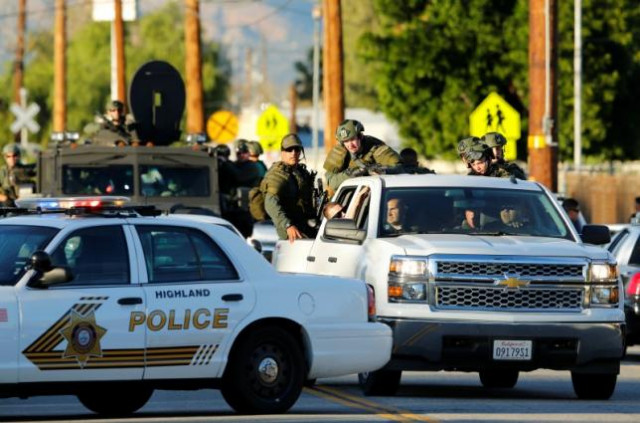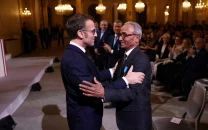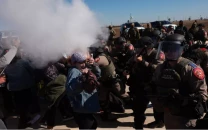US to scrutinise social media in visa reviews following California shooting
Move comes after US visa authorities missed Tashfeen Malik's zealotry on social media

Syed Rizwan Farook and Tashfeen Malik are accused of killing 14 people at a holiday gathering on Dec 2 before dying in a shootout with police. PHOTO: REUTERS
The move is part of the US Department of Homeland Security’s new focus on the use of social media platforms after visa authorities missed San Bernardino shooter Tashfeen Malik’s zealotry on social media, a person familiar with the matter said.
Female attacker from DG Khan praised Da’ish chief
Currently, US authorities check the social media accounts of visa applicants sporadically as part of three pilot programmes that began in earnest earlier this year.
It is unclear how quickly a new process could be implemented.
US visa process missed San Bernardino wife’s zealotry on social media
The pilot programmes currently used by homeland security do not sweep up all social media posts. US officials have kept details of the programmes closely held, as they do not want to reveal the precise process they use to try and identify potential threats.
US visa process missed San Bernardino wife’s zealotry on social media
One of the shooters in the San Bernardino massacre, Tashfeen Malik, sent at least two private messages on Facebook to a small group of Pakistani friends in 2012 and 2014, pledging her support for jihad and saying she hoped to join the fight one day, the Los Angeles Times reported on Monday.
The messages were posted before Malik, 29, entered the United States on a K-1 fiancée visa in July 2014, the Times said, citing two top federal law enforcement officials.
Malik’s messages were recovered by FBI agents investigating whether she and her husband, Syed Rizwan Farook, had been in direct contact with foreign militant organizations and were directed to carry out the December 2 attack in which 14 people were killed, the Times reported.
Father of California shooter says son 'agreed with Islamic State ideology'
The Times said Malik’s Facebook messages indicate for the first time that US law enforcement and intelligence officials missed warnings on social media that she was a potential threat before she applied for her US visa.
The report came as US officials said that since the San Bernardino attack, the US government has begun testing new procedures for reviewing social media activity of foreigners seeking US entry visas.
The officials, who declined to be identified by name, would not discuss specific social media monitoring techniques that are being tested.
But one administration official said the new procedures should help clear up confusion about how far the Department of Homeland Security may go in monitoring the social media activity of visa applicants.
'Tashfeen Malik messaged Facebook friends about support for jihad'
US officials have said their investigation has yet to turn up evidence that foreign militants directed Farook or Malik when they stormed a holiday gathering of Farook’s co-workers and opened fire with assault-style rifles.
The couple fatally shot 14 people and wounded more than 20 in a rampage the Federal Bureau of Investigation said it was treating as an act of terrorism inspired by Islamist militants.
Farook, the US-born son of Pakistani immigrants, and Malik, a Pakistani native he married last year in Saudi Arabia, were killed in a shootout with police hours after the assault in San Bernardino, 60 miles east of Los Angeles.
The FBI has said the couple declared they were acting on behalf of Islamic State. But FBI Director James Comey has said there was no evidence the militant group was aware of them before the attack.
The article originally appeared on The Wall Street Journal.



















COMMENTS
Comments are moderated and generally will be posted if they are on-topic and not abusive.
For more information, please see our Comments FAQ